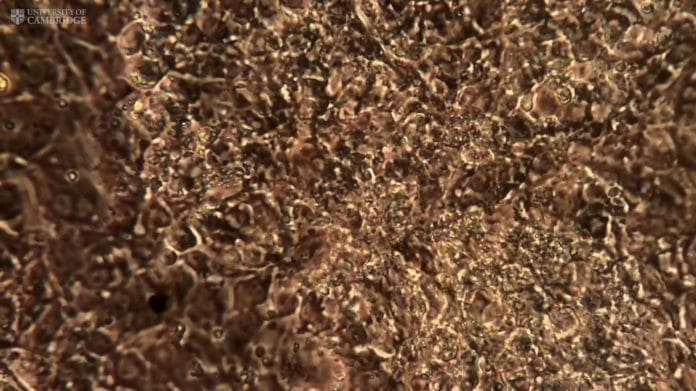Heart is one of the primary organs damaged by SARS-CoV-2 infection. SARS-CoV-2 infects heart cells or ‘cardiomyocytes,’ which contract and circulate blood. Patients with heart problems are more susceptible to die from COVID-19.
Using human embryonic stem cells, a team of scientists at the University of Cambridge has grown a group of heart cells in the lab. These lab-grown heart cells show the same behavior as the cells in the body, beating as if to pump blood. More importantly, these beating heart cells contained the key components necessary for SARS-CoV-2 infection, particularly the ACE2 receptor.
To study how SARS-CoV-2 infects heart cells, the team exposed the lab-grown heart cells to the SARS-CoV-2 spike protein. This model was then used to determine the potential drugs to block infection.
Scientists found that some drugs potentially targeted the proteins involved in SARS-CoV-2 viral entry, reducing infection levels. These included an ACE2 antibody that has been shown previously to neutralize pseudotyped SARS-CoV-2 virus and DX600, an experimental drug.
DX600 is an ACE2 peptide antagonist – that is, a molecule that explicitly targets ACE2. It breaks the activity of peptides that play a role in allowing the virus to break into the cell.
In the study, DX600 was found to be seven times more effective than the antibody. Although, scientists said that it might be because of higher concentrations of the drug. A thing to be noted is that the drug did not affect the number of heart cells, implying that it would be unlikely to be toxic.
Dr. Sanjay Sinha from the Wellcome-MRC Cambridge Stem Cell Institute said: “Using stem cells, we’ve managed to create a model which, in many ways, behaves just like a heart does, beating in rhythm. This has allowed us to look at how the coronavirus infects cells and, importantly, helps us screen possible drugs that might prevent damage to the heart.”
Professor Anthony Davenport from the Department of Medicine and a fellow at St Catharine’s College, Cambridge said: “The spike protein is like a key that fits into the ‘lock’ on the surface of the cells – the ACE2 receptor – allowing it entry. DX600 acts like gum, jamming the lock’s mechanism, making it much more difficult for the key to turn and unlock the cell door.”
“We need to do further research on this drug, but it could provide us with a new treatment to help reduce harm to the heart in patients recently infected with the virus, particularly those who already have underlying heart conditions or who have not been vaccinated. We believe it may also help reduce the symptoms of long COVID.”
Journal Reference:
- Williams, TL et al. Human embryonic stem cell-derived cardiomyocyte platform screens inhibitors of SARS-CoV-2 infection. Communications Biology; 29 Jul 2017; DOI: 10.1038/s42003-021-02453-y
